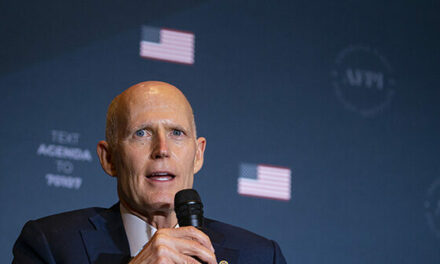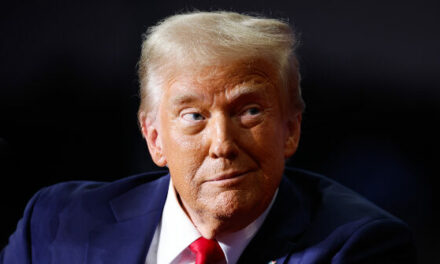We support our Publishers and Content Creators. You can view this story on their website by CLICKING HERE.

While Scott Bessent may be a new name to many Republicans, he has a record of fighting back against the far left’s political agenda from even within what some conservatives would consider the belly of the beast: George Soros’ hedge fund.
Bessent is currently one of the leading contenders to be Donald Trump’s Treasury Secretary. He has been praised by some of the leading economic thinkers associated with American conservatism and the Trump movement. Larry Kudlow, who was Trump’s chief economic adviser in the first term, has said Bessent is “his first choice for Treasury,” adding that he is a “big fan.”
In some ways, Bessent would appear to be an unlikely champion of Trump’s economic vision. Bessent spent the beginning of his career working for Soros, whose advocacy and support of leftwing politics through his notorious Open Society Foundations has made him into a bête noire for many American conservatives. But Bessent was never associated with Soros’s political endeavors and even pushed from within the fund against attempts to adopt a policy of divesting from Israel.
This was back in 2014. After the Israeli military launched Operation Protective Edge in Gaza in response to escalating tensions and rocket attacks, the far left stepped up its pressure campaign to force businesses to divest from Israel. A group from the Open Society Foundation wanted the Quantum Fund, Soros’s hedge fund, to be an early adopter of divest-from-Israel investment principles, calling on the fund to withdraw from investing in companies that did business in Israel. The hope was that if Soros accepted the anti-Israel stance, other investors would follow.
Bessent went to Soros and argued against this. He even threatened to resign—and take with him a number of staffers—if the fund adopted this stance. Ultimately, the fund did not adopt any restrictions on Israel-related investments.
Fighting Against Globalist Currency Manipulation
Bessent was raised in small-town South Carolina. His mother, a businesswoman, went through five marriages, two of them with Bessent’s father, whose ventures in real estate ultimately led to bankruptcy. The financial upheaval, as Bessent recounts in public talks, unsettled the family, spurring him to take on his first summer job at just nine years old.
After attending Yale and interning for Jim Rogers, the outspoken libertarian investor who was Soros’ original partner in the Quantum Fund, Bessent went to work for Soros. He spent eight years leading the firm’s London office. From there, he played a pivotal role alongside former Soros Chief Investment Officer Stanley Druckenmiller in executing the firm’s landmark bet against the British pound—a trade that ultimately netted $1 billion in profits.
The experience of that trade, which was essentially a gamble that the official currency manipulation scheme of European governments pre-Euro was unstable, could prove highly useful as the incoming Trump administration confronts the trade and currency strategies of economies around the globe—especially China’s—that have hurt U.S. workers and sapped U.S. industrial might.
“He beat the globalist machine and he worked inside the enemy camp. Imagine having that experience for our side,” a Trump ally said, asking to remain anonymous because the president has not yet announced his choice for Treasury Secretary.
One of the keys to Bessent’s success at the Soros fund, according to people who worked there, was that Bessent was not intimidated by the leftwing investing icon.
“Scott is definitely not afraid of George,” Buzz Burlock, founder of San Francisco-based hedge fund Origin Capital and a former Soros executive, told the Wall Street Journal in 2013.
Bessent did not agree with a lot of the work done by the nonprofit founded by Soros, the Open Society Foundation, according to the Wall Street Journal.
While Bessent’s public profile is now much larger, he is hardly a newcomer to Trump’s circles. In 2016, Bessent believed that investors and pundits were underestimating Trump’s chances of winning. He bet a big market rally would follow Trump’s victory—a contrarian position at a time when many analysts believed an unexpected win by Trump would be ruinous for stocks—and profited from that foresight. He gave $1 million to Trump’s inaugural committee in 2016.
In recent months, Bessent has been working hard to translate Trump’s economic ideas into concrete policies while also promoting Trump’s agenda in television, newspaper, radio, and online interviews. He has also written several pro-Trump 0p-eds, most recently arguing that the stock market rally following Trump’s win indicates that investors expect robust economic growth from Trump’s policies.
Earlier this year, Bessent said in an 18-page memo to investors that his firm—Key Square Capital Management—was betting on a “Trump rally,” which he described as the market’s buoyant reaction to advances in Trump’s chances of winning the presidency. In February, he appeared on Breitbart Business Digest with Matt Boyle to discuss the Trump trade.
“We really see big opportunities when we are against the narrative,” Bessent said. “And the narrative now is that President Trump with a second term would mean chaos and revenge. I pushed back on that…I think he wants rejuvenation and redemption.”
Bessent has also been an unwavering supporter of Trump’s trade policies, including imposing tariffs on trading partners that insist on continuing with unfair and predatory trade practices. He has done more than almost anyone besides Trump himself to advance the idea that tariffs can be used strategically and marshalled to maximize the gains for the U.S. economy while minimizing disruptions to financial markets and U.S. consumers.
Bessent has also been garnering support from conservatives, including Ralph Reed on Tuesday.

 Conservative
Conservative  Search
Search Trending
Trending Current News
Current News 







